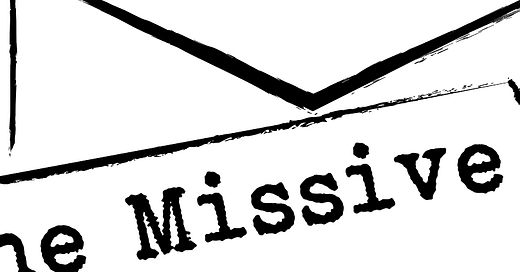Behind-the-scenes of The Missive #10
In the eye of the storm, on the meaning of carrots (and sticks), and whose interest is represented by the Orphan Well Association?
My Scottish/Irish ancestors arrived on the east coast of so-called “Canada” in the late 1700’s or early 1800’s and were part of several waves of genocidal colonization of the Indigenous people who were already here. We arrived uninvited on the traditional unceded territory of the Wəlastəkewiyik (Maliseet) whose ancestors along with the Mi’Kmaq / Mi’kmaw and Passamaquoddy / Peskotomuhkati Tribes / Nations signed Peace and Friendship Treaties with the British Crown in the 1700s. I like to start every new post by explaining my family’s history and keeping this foremost in my mind (and my writing) at all times. I know I have benefited as a result of colonization, and I find the history deeply troubling. It is what motivates me to understand the true history and advocate for real reconciliation. As a child in the 1970’s, I moved west with my family and am grateful to be writing this newsletter now in Moh’kinsstis, and the traditional Treaty 7 territory of the Blackfoot confederacy: Siksika, Kainai, Piikani, as well as the Îyâxe Nakoda and Tsuut’ina nations. This territory is also home to the Métis Nation of Alberta, Region 3 within the historical Northwest Métis homeland. I recognize that the land I now work and live on was stolen from these nations (truth) and I support giving the land back as an act of reconciliation. Lands inhabited by Indigenous Peoples contain 80% of the world’s remaining biodiversity. Indigenous Peoples’ traditional knowledge and knowledge systems are key to designing a sustainable future for all.
Thoughts ahead of the next newsletter (coming soon):
My “retirement” is off and running with a new story in The Energy Mix.
While a category five hurricane was barrelling west on a highly unusual trajectory towards Florida, just days after ANOTHER category four hurricane had left the state (and several others) in shambles, I was delving into the issue of orphan wells in Alberta.
If there is ever a subject to make your blood boil, this is it. Apparently, Energy Minister Brian Jean is doing the opposite of holding fossil fuel companies accountable for the climate chaos and environmental damage they’ve caused. As he told Bob Weber of The Canadian Press, “I don’t like sticks. I like carrots.”
Clearly, Jean doesn’t even understand the metaphor. Carrots in this phrase are meant to be an “unreachable reward to induce a desired behaviour.” The Alberta government is actually giving subsidies to companies, and the companies - with the cash in hand - have no incentive to do anything, let alone the right thing.
And wait until you hear what one company, Perpetual Energy, did to protect its assets from a bankruptcy trustee.
It’s a big failure on so many fronts and we can expect more of the same, probably, based on what I was able to dig up over the last couple of days.
Alberta Faces Scrutiny Over Oil Industry ‘Handouts’ Amid Escalating Well Cleanup Costs
With cleanup and restoration costs for “orphaned” oil wells in Alberta set to double, the provincial government faces mounting pressure to hold oil and gas companies accountable on a number of fronts.
To highlight the adverse effects of provincial policies that subsidize the oil and gas industry while offering it lenience on taxes, the Rural Municipalities of Alberta (RMA) launched a new campaign dubbed “below the drill.” It urges the province to restore financial stability for Alberta’s towns by reversing these policies, describing them as little more than “handouts” to the oil industry.
“We understand the importance of supporting the industry, but these policies seem to be designed solely to cut costs for oil and gas companies, without consideration of how they may erode the very communities that help drive Alberta’s economy,” RMA President Paul McLauchlin said in a news release last week.
The campaign comes on the heels of statements from the provincial government that it won’t rule out using tax dollars to bail out companies. Alberta’s Energy Minister Brian Jean told The Canadian Press last month the industry “might need help from public finances to live up to its legal obligations, as well as lower municipal tax burdens and a lighter regulatory approach.”
As municipalities lament their lost tax revenues, a recent court settlement points to the extent of the clean-up problem facing Alberta—and tactics oil companies employ to avoid financial liability.
Read the full article on The Energy Mix.
Keep reading with a 7-day free trial
Subscribe to The Missive to keep reading this post and get 7 days of free access to the full post archives.



